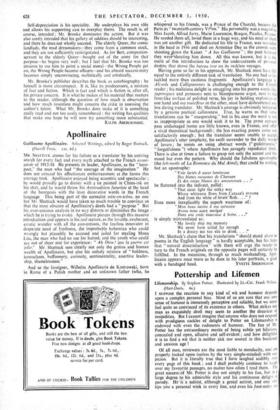Apollinaire
Guillaume Apollinaire. Selected Writings, edited by Roger Shattuck.
(Harvill Press. t 2s. 6d.)
-MR. SHATTUCK atones for his failure as a translatorby his untiring search for every fact and every myth attached to the French avant- garde of 1912-18. He presents its leader, Apollinaire, as the " hero- poet," the man who had " the courage of the imagination." He does not conceal his affectionate embarrassment at ..the forms this courage took. Apollinaire enjoyed being eccentric and spectacular ; he would proudly go to dinner with a tie painted in China-ink on his shirt, and he would throw his Antitradition futuriste at the head of the bourgeois with the least decorative words in the French language. This being part of the surrealist mise-en-scene, no one but M r. Shattuck would have taken so much trouble to convince us that the most obscure of Apollinaire's deeds had a " purpose." But his over-anxious analysis in no way distorts or diminishes the image which he is trying to evoke. Apollinaire pierces through this massive introduction and appears in his real stature, as the lovable, exuberant, erratic wrestler with all the conventions, the fearless innovator in desperate need of freshness, the improbable bohemian who could wrongly but plausibly be accused and jailed for stealing Mona Lisa, the man who had no use for hatred, and the youth who could say out of sheer zest for experience: " Alt Dieu que la guerre est joke." Mr. Shattuck sees tie/iffy not only the genius and human wealth of Apollinaire, but also his unholy mixture of " boldness, iconoclasm, buffoonery, curiosity, sentimentality, assertive leader- ship, shamelessness."
And so the foreigner, Wilhelm Apollinaris de Kostrowski, born 'in Rome of a Polish mother and an unknown father (who, he
whispered to his friends, was a Prince of the Church.), became for Paris its " twentieth-century Villon." His personality was a magnet to Max Jacob, Alfred Jarry, Marie Laurencin, Braque, Picabia, Picasso. He needed them all, loved them in a huge way, and his need of them was yet another gift. He dedicated his life to France, was wounded in the head in 191.6 and died on Armistice Day, as the crowds were' wn the Kaiser. " A bas Guillaume ' ; the poet. believed they wer&shouting him down.. All this was known, but it is the merit of this introduction to show the undercurrents of personal destiny that drove the bateau ivre on its reckless voyages.
Having gone so far in his approach, Mr. Shattuck must have felt equal to the entirely different task of translation. No one had so far.. tackled more than cautious fragments Apollinaire's language in Atcools and Calligrammes is challenging enough to the French reader ; his maliciouS delight in smuggling into his poems words like' zaporogues and pyraustes next to Montparnasse argot, next to the frost-like surface of polished verse, his joy in holding explosives in' one hand and Ma toutefieur in the other, must have disheartened any less* daring translator. Mr. Shattuck's courage is obviously tempered, by . a genuine poetical callousness . True, he warns us that verse: translations can be " exasperating," but in his case the Vvprd is not as inappropriate as one would wish it to be. The prose extracts. pass undamaged (some are, little known, even in France, and offer; a vivid theoretical background) ; the less exacting poems come out: satisfactorily enough ; but the translator seems unable to accept; Apollinaire's utter simplicity, his swift _surrender to the daily words, of lovers ; he insists on using abstract words (" guilelessness," i " forgetfulness ") where Apollinaire has ,savagely repudiated them. There is also at times a failure to grasp not only the accent and the mood but even the pattern. Why should the fabulous apostrophe (the left-motiv of La Romance du Mal Aime"), that could be nothing but an apostrophe: . "Voie lactee soeur lumineuse
Des blancs rutsseaux de Chanaan
Et des corps blancs des amoureuses. . ."
be flattened into the indirect, pallid: "That sister light the milky way Whose whiteness flows from Canaan's streams And from the white of lovers' flesh. ."
Even more inexplicably the superb weariness of.:
. "Mott beau navire 6 ma memoire
Avons nous assez navigue Dans une onde mauvaise a boire. . .."
is simply mistranslated as:
" My lovely ship my memory We never have sailed far enough In a dreary sea too vile to drink. . . ."
Mr. Shattuck's claim that his translations " should stand alone as poems in the English language " is hardly acceptable, but his hope that " natural dissatisfaction" with them will urge the reader to turn to ..the French originals on the opposite pages will certainly be
fulfilled. In the meantime, through so much mishandling, Apol-
linaire appears once more as he does in his later 'Portraits, a giant






































 Previous page
Previous page